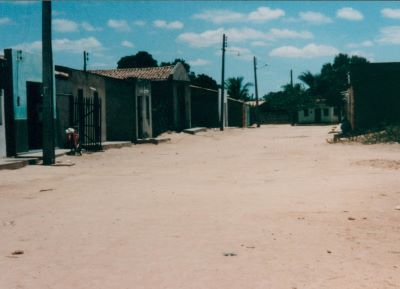Paraiso
by Sr. Therese McDonough MMM U.S.A. 30.11.2022
 Mazinha was lying on the floor of a mud-brick house in the village of Paraiso, located in the interior of Bahia, northeast Brazil. The sun was going down, there was less noise from the children in the street and the coolness of the mud walls, after a long, hot day set the tone for a few precious moments to be with Mazinha.
Mazinha was lying on the floor of a mud-brick house in the village of Paraiso, located in the interior of Bahia, northeast Brazil. The sun was going down, there was less noise from the children in the street and the coolness of the mud walls, after a long, hot day set the tone for a few precious moments to be with Mazinha.
I first met her many years ago when I came to Paraiso from Sao Paulo with two other Medical Missionaries of Mary, Sr. Protagia Peter Slaa from Tanzania, and Sr. Ursula Cott from Ireland. We lived among the people and began our journey in pastoral ministry and health education. Our ministries went beyond the local village to the other thirty rural communities of our parish.
Mazinha was a single parent of one little boy. At the time of our arrival, Mazinha and her son were living with her grandmother and an uncle. Her grandmother was very elderly and required full time nursing care. Mazinha did her best to attend to her needs.
During a political campaign, a doctor from the area, who was running for local office, offered his services to the poor in exchange for votes. Mazinha, like so many of the desperate, took advantage of this and had a tumour removed from her breast. There was no question of mammogram, biopsy nor post-surgical care. She had come to our house to change her dressings. The ugly scar that remains after the cruel surgery is a reminder of the horror and anger I felt, and still feel, at a corrupt and abusive political system that uses the sick to get votes. The months passed, the tumour was malignant and has now spread to her brain.
Her uncle abandoned her, her grandmother was taken to another relative’s house and her son is now with cousins, leaving Mazinha’s care in the hands of Alaide, a neighbour who lovingly assumed responsibility for her. At this stage, Mazinha could only crawl on the ground, could not express herself and depended totally on others for all her needs.
When we arrived in Paraiso, there was no professional medical service available, no programme in health education nor were there preventive measures taken, except for the vaccination campaigns. Sr. Protagia and I are nurses and midwives so our professions were very useful. The three of us, together with the villagers, laboured to bring health education and other preventive medical measures to birth in Paraiso. The process was slow and strenuous, with a lot of challenges, but eventually three full time health workers came to birth.
They spent their days going from house to house, meeting people individually and in groups, leading discussions in health issues. They taught and encouraged the people to take responsibility for their own health. At that time most of their concerns were with pregnant women and children under the age of five. The village was developing an understanding of preventive medicine and a growing trust in the health workers who themselves were growing in self-awareness and confidence.
Part of preventive medicine is teaching and encouraging women to examine their breasts for early detection of any abnormality and immediate referral. Within a short time, the health workers already referred a few women to the health service in the city hospital.
Mazinha just looked up at me with her big, brown eyes. I was saddened I could do no more for her and I felt very helpless. However, with the conscious efforts of the health workers in preventive medicine, hopefully other women will not have to endure the same agony.
That day, it was time for Mazinha’s bath. Alaide and I attended to this – there are many ways to make yourself less helpless.
SEE ALL BLOG POSTS
